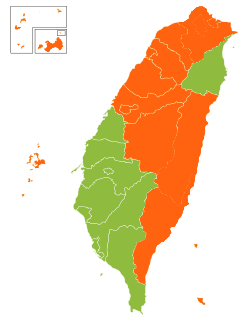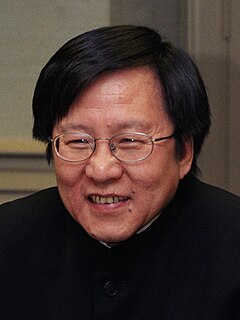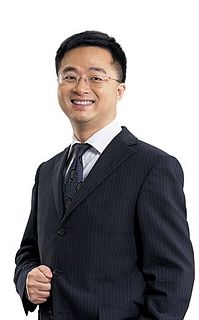
The Democratic Progressive Party (DPP) is a Taiwanese nationalist and center-left political party in Taiwan. Controlling both the Republic of China presidency and the unicameral Legislative Yuan, it is the majority ruling party and the dominant party in the Pan-Green Coalition as of 2022.

Presidential elections were held in Taiwan on 18 March 2000 to elect the 10th-term President and Vice-President of the Republic of China under the 1947 Constitution. With a voter turnout of 82.69%, Chen Shui-bian and Annette Lu of the Democratic Progressive Party were elected president and vice president respectively with a slight plurality. This put an end to more than half a century of Kuomintang rule on Taiwan. This was the first time the ruling party peacefully transferred power to the opposition party.

Annette Lu Hsiu-lien is a Taiwanese politician. A feminist active in the tangwai movement, she joined the Democratic Progressive Party in 1990, and was elected to the Legislative Yuan in 1992. Subsequently, she served as Taoyuan County Magistrate between 1997 and 2000, and was the Vice President of the Republic of China from 2000 to 2008, under President Chen Shui-bian. Lu announced her intentions to run for the presidency on 6 March 2007, but withdrew to support eventual DPP nominee Frank Hsieh. Lu ran again in 2012, but withdrew for a second time, ceding the nomination to DPP chairwoman Tsai Ing-wen. She lost the party's Taipei mayoral nomination to Pasuya Yao in 2018, and stated that she would leave the party. However, by the time Lu announced in September 2019 that she would contest the 2020 presidential election on behalf of the Formosa Alliance, she was still a member of the Democratic Progressive Party.

Su Tseng-chang is a Taiwanese politician serving as premier of the Republic of China (Taiwan) since 2019, and previously from 2006 to 2007. He was the chairman of the Democratic Progressive Party in 2005 and from 2012 to 2014. Su served as Chief of Staff to President Chen Shui-bian in 2004. He leads the second-largest faction in the DPP, after New Tide faction.

You Si-kun, also romanized Yu Shyi-kun, is a Taiwanese politician serving as a member and the president of the Legislative Yuan. He was one of the founding members of the Democratic Progressive Party (DPP), and is known to be a strong advocate of Taiwan independence. He led the DPP as chairman from 2006 to 2007 and served as Premier from 2002 to 2005.

Chang Chun-hsiung, is a Taiwanese politician. He is a former Premier of the Republic of China. Chang was appointed to two separate terms as Premier, both under Chen Shui-bian. His appointment by then-President Chen in 2000 marked the first time a Democratic Progressive Party member occupied the premiership.

This is a timeline of the Republic of China.

Local elections were held in Taiwan on 3 December 2005 to elect magistrates of counties and mayors of cities, councillors in county/city councils and mayors of townships and cities, known as the three-in-one elections, on 10 June 2006 to elect representatives in township/city councils and village chiefs, on 9 December 2006 to elect mayors and councillors of special municipalities, and on 30 December 2006 to elect village chiefs in Taipei City.
Chao Chien-ming is the son-in-law of Chen Shui-bian, the former president of the Republic of China on Taiwan. He married Chen Hsing-yu, Chen Shui-bian's daughter, on 27 September 2001. They have three sons born in 2002, 2004, and July 2006.

Chiu Yi is a former Kuomintang and People First Party legislator of the Republic of China (Taiwan) known for his pro-CCP unification views. He has also been a member of the New Party.

Chiou I-jen, born May 9, 1950, is a Taiwanese politician who was a Vice Premier of the Republic of China between 17 May 2007 and 6 May 2008.

Yao Chia-wen is a Taiwanese politician. He was the second chairperson of the Democratic Progressive Party (DPP), serving from 1987 to 1988. He was a member of the Legislative Yuan from 1993 to 1996, and president of the Examination Yuan between 2002 and 2008.

Chai Trong-rong, sometimes known in English as Trong Chai, was a Taiwanese politician.
The New Tide faction was the centrist and largest faction of the Democratic Progressive Party (DPP) in Taiwan before the party voted to dissolve all factions in 2006. Though dissolved, it remains as the largest faction in the DPP.

Luo Wen-jia is a Taiwanese politician. A member of the Democratic Progressive Party, Luo worked closely with Chen Shui-bian, first as Chen's legislative assistant, and later within Taipei City Government while Chen was mayor. When Chen was elected president in 2000, Luo joined the Executive Yuan as vice chairman of the Council of Cultural Affairs. Between 2002 and 2004, Luo was a member of the Legislative Yuan. He left the legislature for an appointment as head of the Council for Hakka Affairs, from which he stepped down in 2005 to run unsuccessfully for the Taipei County magistracy. Luo was subsequently defeated as a legislative candidate in 2008. Luo returned to politics in 2019, when he was named secretary-general of the Democratic Progressive Party.

Cho Jung-tai is a Taiwanese politician. He served on the Taipei City Council from 1990 to 1998, when he was first elected to the Legislative Yuan. Cho remained a legislator through 2004, when he was appointed deputy secretary-general to the president during the Chen Shui-bian administration. During Frank Hsieh's 2008 presidential bid, Cho assumed the post of Secretary-General of the Democratic Progressive Party. He returned to public service in 2017, as secretary-general of the Executive Yuan under Premier William Lai. In 2019, Cho succeeded Tsai Ing-wen as leader of the Democratic Progressive Party. He remained leader of the party until May 2020, when Tsai resumed the role.
Events from the year 2005 in Taiwan, Republic of China. This year is numbered Minguo 94 according to the official Republic of China calendar.
Events from the year 2000 in Taiwan, Republic of China. This year is numbered Minguo 89 according to the official Republic of China calendar.
Yen Chin-fu is a Taiwanese politician. A co-founder of the Democratic Progressive Party, he served in the Legislative Yuan from 1993 to 2005.

The Formosa Alliance is a political coalition founded in Taiwan on 7 April 2018. The organization reformed as a political party on 20 July 2019.


















